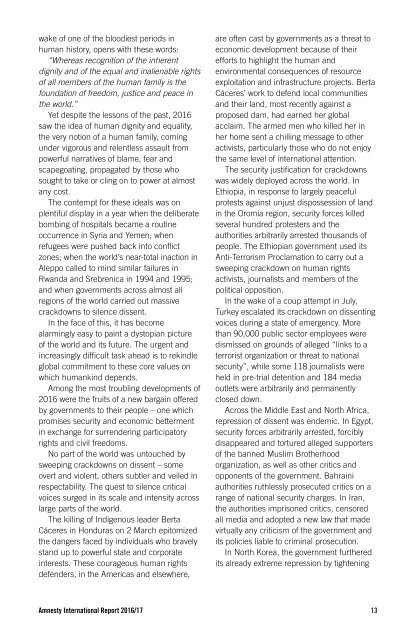AMNESTY INTERNATIONAL REPORT 2016/17
2lEHU9j
2lEHU9j
You also want an ePaper? Increase the reach of your titles
YUMPU automatically turns print PDFs into web optimized ePapers that Google loves.
wake of one of the bloodiest periods in<br />
human history, opens with these words:<br />
“Whereas recognition of the inherent<br />
dignity and of the equal and inalienable rights<br />
of all members of the human family is the<br />
foundation of freedom, justice and peace in<br />
the world.”<br />
Yet despite the lessons of the past, <strong>2016</strong><br />
saw the idea of human dignity and equality,<br />
the very notion of a human family, coming<br />
under vigorous and relentless assault from<br />
powerful narratives of blame, fear and<br />
scapegoating, propagated by those who<br />
sought to take or cling on to power at almost<br />
any cost.<br />
The contempt for these ideals was on<br />
plentiful display in a year when the deliberate<br />
bombing of hospitals became a routine<br />
occurrence in Syria and Yemen; when<br />
refugees were pushed back into conflict<br />
zones; when the world’s near-total inaction in<br />
Aleppo called to mind similar failures in<br />
Rwanda and Srebrenica in 1994 and 1995;<br />
and when governments across almost all<br />
regions of the world carried out massive<br />
crackdowns to silence dissent.<br />
In the face of this, it has become<br />
alarmingly easy to paint a dystopian picture<br />
of the world and its future. The urgent and<br />
increasingly difficult task ahead is to rekindle<br />
global commitment to these core values on<br />
which humankind depends.<br />
Among the most troubling developments of<br />
<strong>2016</strong> were the fruits of a new bargain offered<br />
by governments to their people – one which<br />
promises security and economic betterment<br />
in exchange for surrendering participatory<br />
rights and civil freedoms.<br />
No part of the world was untouched by<br />
sweeping crackdowns on dissent – some<br />
overt and violent, others subtler and veiled in<br />
respectability. The quest to silence critical<br />
voices surged in its scale and intensity across<br />
large parts of the world.<br />
The killing of Indigenous leader Berta<br />
Cáceres in Honduras on 2 March epitomized<br />
the dangers faced by individuals who bravely<br />
stand up to powerful state and corporate<br />
interests. These courageous human rights<br />
defenders, in the Americas and elsewhere,<br />
are often cast by governments as a threat to<br />
economic development because of their<br />
efforts to highlight the human and<br />
environmental consequences of resource<br />
exploitation and infrastructure projects. Berta<br />
Cáceres’ work to defend local communities<br />
and their land, most recently against a<br />
proposed dam, had earned her global<br />
acclaim. The armed men who killed her in<br />
her home sent a chilling message to other<br />
activists, particularly those who do not enjoy<br />
the same level of international attention.<br />
The security justification for crackdowns<br />
was widely deployed across the world. In<br />
Ethiopia, in response to largely peaceful<br />
protests against unjust dispossession of land<br />
in the Oromia region, security forces killed<br />
several hundred protesters and the<br />
authorities arbitrarily arrested thousands of<br />
people. The Ethiopian government used its<br />
Anti-Terrorism Proclamation to carry out a<br />
sweeping crackdown on human rights<br />
activists, journalists and members of the<br />
political opposition.<br />
In the wake of a coup attempt in July,<br />
Turkey escalated its crackdown on dissenting<br />
voices during a state of emergency. More<br />
than 90,000 public sector employees were<br />
dismissed on grounds of alleged “links to a<br />
terrorist organization or threat to national<br />
security”, while some 118 journalists were<br />
held in pre-trial detention and 184 media<br />
outlets were arbitrarily and permanently<br />
closed down.<br />
Across the Middle East and North Africa,<br />
repression of dissent was endemic. In Egypt,<br />
security forces arbitrarily arrested, forcibly<br />
disappeared and tortured alleged supporters<br />
of the banned Muslim Brotherhood<br />
organization, as well as other critics and<br />
opponents of the government. Bahraini<br />
authorities ruthlessly prosecuted critics on a<br />
range of national security charges. In Iran,<br />
the authorities imprisoned critics, censored<br />
all media and adopted a new law that made<br />
virtually any criticism of the government and<br />
its policies liable to criminal prosecution.<br />
In North Korea, the government furthered<br />
its already extreme repression by tightening<br />
Amnesty International Report <strong>2016</strong>/<strong>17</strong> 13


